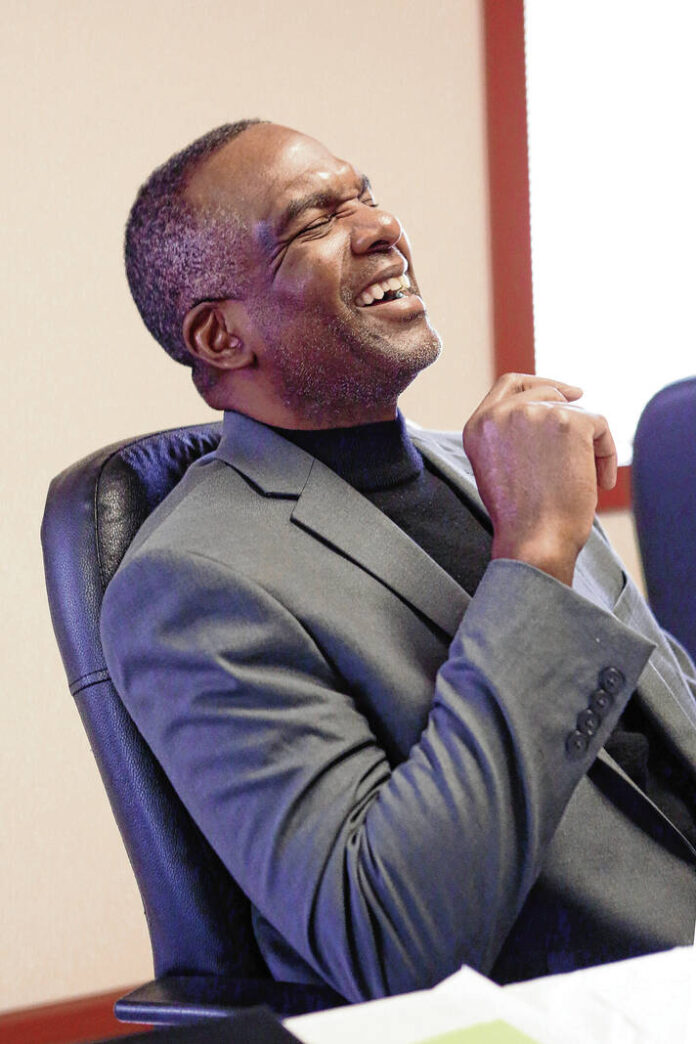During business hours, Frank J. Griffin spends much of his time creating programs that support social justice and racial equity through his job as a program director with the Cummins Foundation in Columbus.
After hours, he leads Calvary Community Church, a predominantly African American congregation that was founded in Columbus with a huge emphasis on social justice.
The 59-year-old Columbus man didn’t set out to connect the dots between his eventual secular and spiritual roles, but he is convinced that divine intervention is responsible.
“It’s a God thing,” Griffin said of the two significant changes in his work and personal lives over the past few years.
The path Griffin would take in life was laid out a half-century earlier by his late parents — Frank G. Griffin, a General Motors machinist in Indianapolis, and Jean Griffin, a nurse’s assistant at the former Central State Hospital in Indianapolis.
The Griffins lived on the west side of Indianapolis, where their boys Frank and Sam attended Crispus Attucks High School.
“I had great parents — very conservative, very religious. They gave me and my younger brother every opportunity to be successful,” Frank Griffin said.
“My parents were not educated, but valued education,” Griffin said.
While neither parent finished high school, both of their sons earned college degrees — Frank from Purdue University, and Sam — who also works for Cummins — from Xavier University in New Orleans.
With a high aptitude for math and science in high school, Crispus Attucks guidance counselors suggested that Frank consider a career in engineering.
“So that’s what I did,” Griffin said. “Engineering was never a passion, but a path.”
While unsure at the start of where his education might eventually lead him, Griffin was certain about wanting to get a good job and a secure income.
“Engineering opens up a lot of doors,” he said.
For Griffin, that included the front doors to some of the world’s largest corporations — Westinghouse, Alcoa, ArvinMeritor and Cummins Inc., a global power technology leader headquartered in Columbus since 1919, and where Griffin has worked since 2005.
Griffin has held roles with Cummins in Oil and Gas Markets, Mining Business Development and, since 2020, in Corporate Responsibility within the Cummins Foundation.
Griffin’s current work responsibility focuses on CARE, an acronym for Cummins Advocating Racial Equity.
The program was put into place four months after the May 25, 2020, death of George Floyd at the hands of Minneapolis city police officers.
“We responded,” Griffin said, with Cummins creating a program that would foster meaningful, impactful change.
CARE attempts to create sustainable change for Black equity in the United States, with four foundational pillars:
- Social justice
- Economic improvement
- Police reform
- Criminal justice reform
About 500 Cummins employees initially volunteered to identify opportunities to work on those pillars in communities where Cummins operates. With ideas in hand, CARE looks for local community partners to create and support sustainable change.
Two CARE projects are underway in Columbus:
- Working with the Community Education Coalition to improve academic achievement for Black and biracial students is now starting its second year.
- Economic empowerment through Targeted Investment for Minority Entrepreneurs (TIME), working with the NAACP to identify Black-owned businesses and provide needed funding.
“Both of these have been very successful,” Griffin said.
In Indianapolis, Cummins just launched its first Indiana-based Technical Education for Communities (TEC) workforce development program at Arsenal Technical High School. It provides school-based, industry-supported vocational skills training for unemployed or underemployed people to earn good jobs close to home.
His calling
Griffin’s religious roots were established at Grace Apostolic Church on the west side of Indianapolis, where his father was a church deacon.
That’s also where Charles A. Sims served as a youth minister until relocating to Columbus for a shipping and receiving supervisory job with Cummins. A year later, Sims founded Calvary Community Church, serving as senior pastor until retiring last summer after 47 years.
“I remember him,” Sims said of a young Frank Griffin. “He used to play on the playground near the home we lived in at the time.”
But Sims wouldn’t really come to know Griffin well until years later, after Griffin and his wife, Debra, relocated from the East Coast to Columbus for work opportunities.
At the urging of his church-deacon father and his wife, Griffin eventually visited Calvary for Sunday services led by Bishop Sims, albeit with some hesitation.
Griffin, in his early 30s, would choose a pew near the back of the large church so he had a quick way out the front door “before Pastor Sims could catch me. But eventually, the presence of God and the calling of God was too much, and I surrendered,” Griffin said, becoming a Calvary member the following year.
“He had an experience with God and he made a commitment to be in a relationship with God. From that point on, he was all in,” Sims said.
In 1998, Griffin started taking theology classes at Calvary Midwest Bible College and Theological Seminary, operated inside the Calvary church by Sims and his wife, Jane, from the late 1980s through 2016.
In after-business hours from his corporate job, Griffin spent the next 11 years earning his bachelor’s, master’s and doctorate degrees in theology.
Griffin was only 4 years old when the Rev. Dr. Martin Luther King, the American Baptist minister and civil rights leader, was shot to death in 1968, in Memphis, Tennessee. But King became a role model later in life for Griffin, as he learned more about the slain preacher and his legacy.
“I was fascinated by his leadership, his charisma and his effectiveness,” Griffin said of King’s civil rights work in the 1950s and 1960s.
A year after completing his studies at the Bible College, Griffin founded Thy Kingdom Come Ministries in Greenwood in 2010 and served as senior pastor until July 2022, when another door opened for him.
Sims, 79, had taught sessions on effective pastoral succession for church congregations. It had also been the subject of his doctoral dissertation in theology. So, when he set out to find a capable successor as Calvary pastor, Sims said he was practicing what he was preaching.
“Frank had served under me as one of the assistant pastors for a number of years and had done a very good job. Very faithful. Very helpful. Then I watched him as he established the church in Greenwood,” Sims said. “He had also established a very good relationship with the parishioners of Calvary.”
After praying over the decision, Sims asked for a meeting with Griffin to see whether he would be willing to take over the pastoral reins at Calvary Community Church — and Griffin agreed.
“When I shared that information with the church board and the congregation, they were ecstatic,” Sims said.
“I don’t take it for granted that my path has focused me significantly on social justice,” Griffin said.
As the church’s new pastor, Griffin said he will keep the foundational focus much the same:
- Social justice
- Acceptance
- Significant community involvement with a greater focus on outreach outside the walls of the church.
“I think it’s God’s will,” he said.
As a result, Griffin serves as a champion for social justice and racial equity from the time he gets up in the morning until he retires for the night.
“I find Columbus to be a fascinating community that has the opportunity to do great things in all areas of equity and diversity,” Griffin said.
But no community is perfect.
“The biggest struggle for Columbus is being in southern Indiana. There’s generational racism. We still struggle with that today. I see that most in the school system with our kids. Kids are immature. They do what they see — at home or with friends,” Griffin said.
The African American and biracial black communities combined make up about 5 percent of the city’s population, which is predominantly white.
“Some of the majority population are very hurtful in what they do or say,” said Griffin, who believes that’s no different than in other school corporations with similar demographics.
“The (Bartholomew Consolidated) school system does an outstanding job trying to support all of the students. There’s no blame on the school system. It’s just the environment that we’re in,” he said.
Griffin becomes aware of racial incidents involving Black or biracial community members through his work with the African American Pastors Alliance.
“As things come in, we’re working together to create sustainable change. I feel good about the leadership we have in the community — mayor, chief of police, sheriff,” Griffin said.
When conflict arises, Griffin sees himself as a peacemaker.
“It’s not something I’ve worked toward, but who I am,” Griffin said.
It’s just one of Griffin’s notable traits, according to his religious mentor.
“Frank showed us to be a lover of people,” Sims said. “He’s very passionate about what he’s doing, whether it is at his secular job or at the church.”
But Griffin, who as a young adult struggled with fear and self-esteem, sees himself as far from perfect.
“I’m still a work in progress,” he said.





